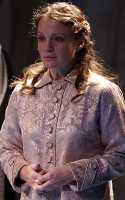SITE GUIDE
SEARCH
REVIEWS
REVIEW ARCHIVES
ADVERTISING AT CURTAINUP
FEATURES
NEWS
Etcetera and
Short Term Listings
LISTINGS
Broadway
Off-Broadway
NYC Restaurants
BOOKS and CDs
OTHER PLACES
Berkshires
London
California
New Jersey
DC
Connecticut
Philadelphia
Elsewhere
QUOTES
TKTS
PLAYWRIGHTS' ALBUMS
LETTERS TO EDITOR
FILM
LINKS
MISCELLANEOUS
Free Updates
Masthead
A CurtainUp Review
Rosmersholm
By Elyse Sommer
|
There must be no more sides . . .I believe that once free of all these endless vicious party rivalries, free of personal slanders, jealousies, backbiting — the good in man will flourish— Rosmer, in response to Dr. Kroll's asking him to endorse his newspaper's ultra conservative view. But though the men are old friends, when Kroll learns that Rosmer's new beliefs are part of his having abandoned his faith turns antagonistic and greets Rosmer's plea to at least keep their differences civil with "who is not with me is against me" Here at Rosmersholm they don't easily let go of the dead—Rebecca It's the dead that won't let go of the ones they leave behind.. It's what folks call. . .the White Horse of Rosmersholm.—Mrs. Helsveth, as the women are observing Rosmer return from his walk, wondering if he'll finally bring himself to walk across the footbridge with its memories of his wife's suicide there over a year ago. |

Austin Pendleton as Dr. Kroll
(Photo: Gregory Costanzo) |
And so this last drama to challenge a world where politics as usual tends to inhibit the better instincts of both liberal and conservatives, Ibsen created Johannes Rosmer (Bradford Cover), who has undergone a conversion that have led him to renounce his faith as well as his family's history of power without compassion. The drama pits Rosmer against representatives of the newly empowered liberals and the ultra conservatives determined to regain their power.
To speak for the conservatives there's Dr. Kroll (Austin Pendleton whose previous stints with the Pearl were as director of a highly praised revival of Toys in the Attic and Vieux Carre), the politicized head of a traditional local college and the brother of Rosmer's late wife Beata. To proselytize for the other side, there's the liberal newspaper editor Peder Mortensgaard (Dominic Cuskern). Supporting and, in fact, nurturing Rosmer's new independence, is his late wife's companion Rebecca West (Margot White).
Does all this evokes scenes being played out on the current American landscape? Well, that's exactly why Ibsen's social and political themes and the psychological insights into his characters continue to make his plays relevant and that have led to his being dubbed the Father of Modern Drama.
The exchange between Rebecca West and the family servant, Mrs. Helseth, with its references to a metaphoric White Horse forebodes Ibsen's penchant for melodramatic endings more typical of anciet Greek tragedies than modern dramas. Rosmersholm does indeed veer towards credibility stretching melodrama in its final act. While neither Mike Poulton, the Pearl production's translator, or director Elinor Renfield shy away from this more problematic aspect of the play, the balance is tilted just enough towards the contemporary, realistic parallels to make the somewhat problematic ending a minor quibble given the overall pleasures on display: complex characters believably portrayed; and effective scenery, costumes and lighting to establish time and place.

Margaret White as Rebecca Westl
(Photo: Gregory Costanzo) |
Margot White is an impassioned Rebecca. She captures her character's complexities and vulnerability, most persuasively so in the second act when her past and future collide. Pearl regular, Bradford Cover brings out every nuance in the sensitive Rosmer's character. His lingering guilt over his wife's suicide reveals a certain portentous emotional befuddlement. There's something of the naïf in his new optimism. Yet he's admirably firm in his refusal to head the editorial board of either the conservative paper Kroll and his cronies have just taken over, or to support the liberal editor Mortensgaard (Dominic Custern). Custern's Mortensgaard adds a delicious sardonic touch to the proceedings as a man who personally couldn't care less whether Rosmer is a Christian, but who knows his God-fearing readers would want nothing to do with a man who's abandoned his faith. And so, like Kroll, he too turns his back on Rosmer.
Custern is fine in his cameo appearance as are two other Pearl regulars: Robin Leslie Brown in the minor role of the loyal servant, and Dan Daily as Ulrik Brendel, a somewhat buffoonish, penniless former tutor who's become a druken would-be purveyor of visionary wisdom. However, it's Austin Pendleton's Dr. Kroll who stands out most as the play's semi-villain.
Pendleton is a wonderful mix of smarminess. and genuine belief in the established order that views the poor as the unredeemable lowest of the low. He's all pleasant good will during his first visit to Rosmersholm when he is bent on enlisting Johannes to help run the newly acquired right wing paper, even slily suggesting that he sees nothing wrong in Rebecca taking his dead sister's place as Rosmersholm's mistress. That all smiles and flattery manner turns nasty and unforgiving and ultimately contemptibly mean enough to pave the way for the realistic plot to give way to Greek tragedy and the symbolism foreshadowed by those white horse comments.
The Pearl Theatre Company has long been one of New York's artistic treasures, a company of resident actors committed to classical plays from the long ago and not so distant past. The company's move from its long time home in the East Village to City Center's smaller theater has given it a more mainstream presence and a good deal of well-deserved praise. The big drawback to the uptown move is that the theater is a three-sided thrust which inevitably entails problematic sightlines for people sitting in the side sctions. To Ms. Renfield's credit she has directed the actors to minimize those viewers' sense of exclusion though at times, the actors' movements are almost self-consciously and distractingly geared to insure all-around visibility. Still, this is a case of taking the bad with the good. While I'd recommend trying to get tickets in the center section, it would be better to see this fine production of a rarely done play in any available seat rather than to miss it.
For more about Henrik Ibsen's work and links to plays by him reviewed at Curtainup, see our Ibsen Backgrounder.
|
Rosmerholm Henrik Ibsen play adapted by Mike Poulton Directed by Elinor Renfield. Cast: Cast: Robin Leslie Brown (Mrs. Helseth), Bradford Cover (Johannes Rosmer), Dominic Cuskern (Peder Mortensgaard), Dan Daily (Ulrik Brendel), Margot White (Rebecca West) and Austin Pendleton (Doctor Kroll). Sets: Harry Feiner Costumes: Niki Hernandez-Adams Lighting: Stephen Petrilli Sound: Toby Jaguar Algya Stage manager: Dale Smallwood Dramaturg: Kate Farrington Running Time: 2 1/2 hours includes one intermission Pearl Theater at New York City Center Stage II, at 131 West 55th Street (between 6th and 7th venues) From 11/12/10; opening 11/21/10; closing 12/19/10. Review by Elyse Sommer based on 11/23/10 performance |
|
REVIEW FEEDBACK Highlight one of the responses below and click "copy" or"CTRL+C"
Paste the highlighted text into the subject line (CTRL+ V): Feel free to add detailed comments in the body of the email. . .also the names and emails of any friends to whom you'd like us to forward a copy of this review. Visit Curtainup's Blog Annex For a feed to reviews and features as they are posted add http://curtainupnewlinks.blogspot.com to your reader Curtainup at Facebook . . . Curtainup at Twitter Subscribe to our FREE email updates: E-mail: esommer@curtainup.comesommer@curtainup.com put SUBSCRIBE CURTAINUP EMAIL UPDATE in the subject line and your full name and email address in the body of the message. If you can spare a minute, tell us how you came to CurtainUp and from what part of the country. |

Slings & Arrows-the complete set
You don't have to be a Shakespeare aficionado to love all 21 episodes of this hilarious and moving Canadian TV series about a fictional Shakespeare Company






